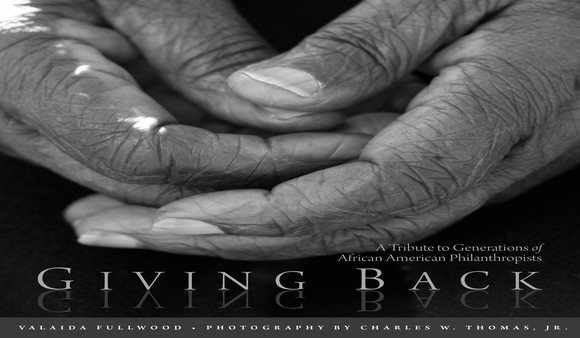Culture
Reframing Portraits of Philanthropy

Valaida Fullwood, author of Giving Back: A Tribute to Generations of African American Philanthropists
Radical simply means ‘grasping things at the root.’ — Angela Davis
Let’s engage in the radical work of reclaiming the root meaning of philanthropy: love of humanity. Philanthropy, a curious word to many, evokes a range of images, beliefs and emotions. To contemplate its semantics and evolution and then to initiate anew our collective philanthropic practice could prove a seminal undertaking for black America.
This moment hangs ripe. The “season of giving” is near and clears the way to a new year of possibilities. The election of President Barack H. Obama has substantiated, again, the might of black unity. And yet, between the hopes and history making and the thanks and gifts giving are uncharitable acts and vitriol that signal a shift back in time, not forward. Indignities, inequities and injustices do not simply dissipate; instead, we must come together in systematically uprooting them.
With community needs great and the need for unity greater, the times beckon a new era of conscientious philanthropy rooted in a love for community and expectations of social change. Let this generation, both young and old, embody a social transformation with bold recognition of our power and responsibility to give back.
Philanthropy is a gateway to power. It is a chief means to acquiring, sustaining and strengthening our status—economically, politically, socially and spiritually. Our ancestors knew this. They originated and supported systems for giving and assisted members of the community, whether neighbor, stranger or kin. Remarkably, a fundamental source of our progress at times seems forgotten.
Remembering our long and prolific history of philanthropy is crucial. Historical accounts of black largesse and examples of culturally significant vehicles of giving abound. Look up the Free African Society, an 18th century mutual aid organization established by Richard Allen and Absalom Jones. Study the social justice philanthropy of the legendary Madam CJ Walker. Before the Civil War, up through the Civil Rights struggle and after, our forebears charted paths and lay blueprints for 2012 National Philanthropy Day (Nov 15) Op-Ed Valaida Fullwood progress. While the impulse to “give back” lives on in the community and opportunities exist to bring new twists to old traditions, this work must be encouraged and nurtured.
In the starkest of ironies, black Americans give the highest percentage of discretionary income to charitable causes when compared to other racial groups in America; and yet our philanthropy is discounted and overlooked by mainstream society. Indeed, within the black community, our traditions of giving are seldom acknowledged or celebrated, or even described as philanthropy. Absurd as it is, this cultural disconnect persists for many reasons and shortchanges us all.
Ideas and images of present-day philanthropy frequently fail to resonate and, worse yet, serve to alienate black Americans. Particularly unsettling is the stunning absence of black people in representations of philanthropists—a few select luminaries notwithstanding. A point of view endures that renders black donors and benefactors, in effect, invisible. The familiar picture of philanthropy is narrowly framed and thus gives a false impression that the only giving that matters is beyond the average person’s means.
On the demand side of philanthropy—as beneficiaries and “the needy”—is a common context for depictions of black children, families and communities. While but one facet of philanthropy, imagery around whites as the benefactors and blacks as those in need has devolved into a stubborn stereotype and produced a picture that distorts and is incomplete.
A richer picture exists. Widening the lens to include our customs and stories of giving yields a different view. Vibrant philanthropy is occurring in black communities, whether labeled as such or not. Even so, great promise rests in sharpening our focus to affect social change. Collectively, black America possesses the assets—heart, head, heritage and dollars—to eradicate a host of social ills. With our legacy of generosity, our shared stake in change and our capacity to leverage centuries-long gains in wealth, education and access, how could we not?
Exercising this power first requires a shift in thinking and wider recognition of the power of black philanthropy. Strategic alliances among black donors, across black communities and with institutional partners also are vital.
Significant in seizing the moment and sustaining the effort is love. Love of family. Love of culture. Love for thy neighbor as thyself. In its truest sense, philanthropy is 2012 National Philanthropy Day (Nov 15) Op-Ed Valaida Fullwood rooted in love. Advancing social change with that spirit opens opportunities for everyone to participate and fixes the focus on liberating people not elevating oneself.
Putting our money where our heart lies. That is the charge. Begin doing your part today by deepening your knowledge of philanthropy, by examining your motivations for giving and by joining with others to grasp at the root causes of our collective concerns—for love.

-

 Featured10 months ago
Featured10 months agoCalifornia Is the First State to Create A Public Alert for Missing Black Youth
-

 Featured10 months ago
Featured10 months agoAfrican American Leaders Stay the Course Amid Calls for President Biden To Bow Out of Race
-

 Featured10 months ago
Featured10 months agoThe Debate Fallout Lands on Both Candidates
-

 Featured9 months ago
Featured9 months agoPresident Joe Biden Decides to Withdraw from the Presidential Race
-

 Featured10 months ago
Featured10 months agoPresident Joe Biden Describes Shooting of Donald Trump As ‘Sick’
-

 Featured9 months ago
Featured9 months agoIn One of His Final Speeches as President, Biden Says It’s Time for ‘Fresh Voices’

